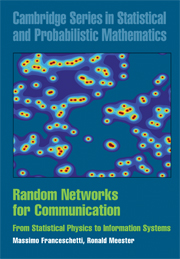Preface
Published online by Cambridge University Press: 12 December 2009
Summary
What is this book about, and who is it written for? To start with the first question, this book introduces a subject placed at the interface between mathematics, physics, and information theory of systems. In doing so, it is not intended to be a comprehensive monograph and collect all the mathematical results available in the literature, but rather pursues the more ambitious goal of laying the foundations. We have tried to give emphasis to the relevant mathematical techniques that are the essential ingredients for anybody interested in the field of random networks. Dynamic coupling, renormalisation, ergodicity and deviations from the mean, correlation inequalities, Poisson approximation, as well as some other tricks and constructions that often arise in the proofs are not only applied, but also discussed with the objective of clarifying the philosophy behind their arguments. We have also tried to make available to a larger community the main mathematical results on random networks, and to place them into a new communication theory framework, trying not to sacrifice mathematical rigour. As a result, the choice of the topics was influenced by personal taste, by the willingness to keep the flow consistent, and by the desire to present a modern, communication-theoretic view of a topic that originated some fifty years ago and that has had an incredible impact in mathematics and statistical physics since then. Sometimes this has come at the price of sacrificing the presentation of results that either did not fit well in what we thought was the ideal flow of the book, or that could be obtained using the same basic ideas, but at the expense of highly technical complications.
- Type
- Chapter
- Information
- Random Networks for CommunicationFrom Statistical Physics to Information Systems, pp. ix - xPublisher: Cambridge University PressPrint publication year: 2008

